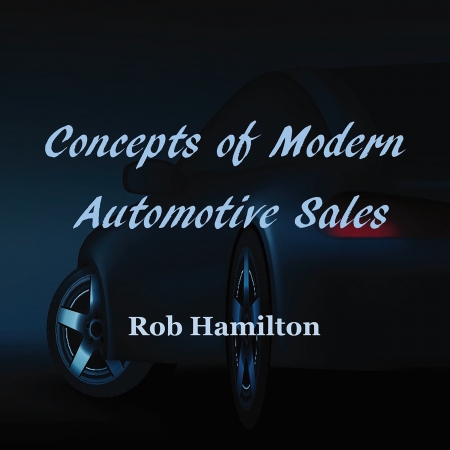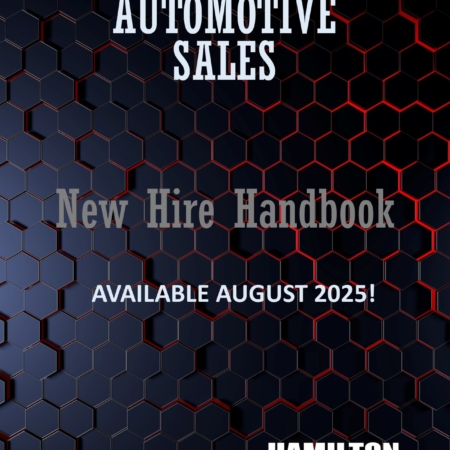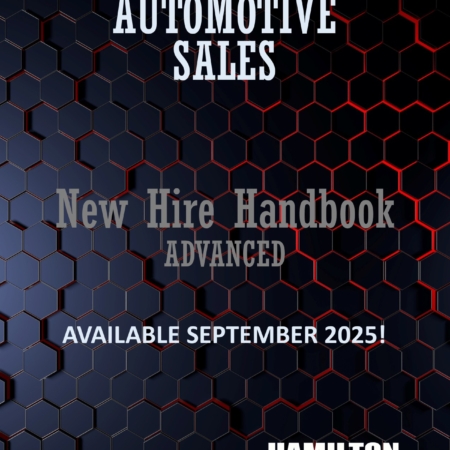“The more skilled a sales consultant becomes, the more this business becomes a sport rather than a job.”
INTRODUCTION
The idea that the sales profession in general needs to evolve is certainly not a new one. What is certain is that it is even more clear and necessary in my chosen profession of automobile sales. And, because of the great efforts of the many, still a minority perhaps, who are brighter than I, we are turning a corner. There is still much to do, however. We must continue to squash the stereotype and cliché. We must perpetuate the professionalism of newer strategies and tactics. But more than understand these ourselves, more than the utilization of these things within a small circle of those in the know, we are tasked with the sharing and teaching of these powerful concepts with and to a new generation of consultants.
I have been reading several absolutely wonderful posts and comments that speak to the subject. I sense a passion out there similar to my own, and it is encouraging. So, what now?
Well, I don’t suppose there is much out there in the way of snake oil or miracle elixirs being sold. But, the smoke and mirrors, shell games and the idea that somehow we partake in a magic show must be eliminated. While being ultra-optimistic to the extent of believing Utopia can be created and achieved might be foolish, I choose to pursue the foolishness.
To evolve effectively and properly, we must now fully acknowledge that the INTERPRETATION OF DATA should be added to our sales process and used always. If we embrace the concept that EVERYTHING is market-based, from the price of new and pre-owned vehicles to trade-in values, we must convey this concept to each and every customer. It is truly no longer a magic show, but an interpretation of market data. After following the process, asking the proper questions (interview) and giving a world-class presentation and demonstration that is so powerful and engaging that it makes the sales consultant a dinner topic, this interpretation of market data must be a key focus.
“We already do that!” was an exclamation made by an experienced and accomplished consultant at a recent workshop, when the idea of utilizing a source like Kelley Blue Book to establish value was proposed. Fair enough. This has been done for a long time. As was further explained, however, what is it actually telling us? First, let’s jump to CARFAX, which has, for better or worse, had an enormous impact on our business. Talk about reckless misinformation… “I just want to buy a safe car. Show me a car with no accidents.” Hmmm. So the conclusion is that a vehicle with reported accidents, even with today’s advanced technology and the skillful technicians we have at our facilities, is somehow not safe or less safe? This is a non sequitur and does not follow logic. And it is irresponsible. But there are so many of these influential sources which we must combat on a daily basis. So, what has this done? Well, vehicles with one owner, no accidents, and documented maintenance will bring quite a bit more money than those which have multiple owners, a single or multiple accidents or damage, and little or no documented maintenance. This is true, of course, for the retail unit and the trade-in, and it is true to a far greater degree than before.
Back to Kelley Blue Book… The far left of the value gauge can represent the vehicles which Carfax has devalued; the far right can represent one owner vehicles with no accidents. This is a powerful value-setting and negotiating tool and should be used whenever it represents an advantage to us. And it does frequently. Most of us have also taken note of the influence that has given us a wider spread from trade-in to retail than we have had in the past. It is not difficult to create volume and gross by simply establishing this as the marketplace.
For new vehicles, even True Car can be valuable to us. If a consumer makes a ridiculous offer, and dependent upon your facility and its philosophy, you might break this out to justify what dollar the new vehicles are bringing in the market. What vehicles and data go into the equation? Could not the lowest priced units be reflective of demonstrators, vehicles which have been damaged and repaired, or sold with incentives for which the particular customer might not qualify? Then, a premium, fresh, scarce unit should bring a bit higher dollar? Of course.
These are just a few things to consider, but more and continuous interpretation is required to be sure.
The evolved sales process will also include the following:
- The pursuit of Customer Comfort and Consultant Confidence
- The Practice of Feigned Indifference
- The Utilization of Market-Based Pricing and the Technique
The first seems obvious, but it is a pursuit because it is difficult to achieve fully. These two states are directly proportional, however. As one increases, so does the other. If the other drops, it brings the first with it. But this is why training and instruction is so vital. If the consultant is not confident, the customer will be too uncomfortable to be receptive to his or her words. Then we have nothing.
The second flies right into the face of the traditional. Feigned Indifference is to pretend to have no bias or preference as to whether a customer buys a vehicle today or not. “Please take as long as you’d like” and “Buy the vehicle when it represents a value to you” are examples. But, remember, the indifference is feigned. We still ask for the business as many times as is necessary and we still create the urgency that is required.
We have addressed a bit of market-based pricing, and of course there is much more. The Technique is to simply counter-transition-close to any step on the road to the sale. The counter, too, is in opposition to those who prefer to always agree with the customer. The idea that the customer is always right is a fable. Understand this please. With the misinterpretation of data and false pre-conceived notions, a skilled consultant must consistently nudge the consumer back to the road to the sale. An example of the Technique could be used if a customer on the lot objects to the price of a pre-owned vehicle, for instance… “The price is too high.” The response… “Actually, these have been selling for a bit more than this in the marketplace (counter). Understanding that (transition), let me show you why this vehicle represents such a great value (close to a presentation in this case). This is just a basic example. The Technique is a tactic which has a multitude of applications.
We, in this profession, are on the right track. If we want to get away from “If I could, would you?” being the sole close (although there is still a place for that too – not near the beginning of the process, of course), we must continue to share ideas. There are a lot of great people out there.
When many of us think about sales training or instruction, the first idea might be that someone is trying to sell a process or system. One would hope not… We have had a process, or Road to the Sale, that has served us well for many decades. In fact, it is so basic, necessary, and obvious that most systems incorporate the very same steps, perhaps in a different order. Keep in mind, however, that customers naturally influence, consciously or unconsciously, the order of our process. The sales consultant must do his or her best to maneuver the customer back into the process without making the customer uncomfortable. Not a simple task, to be sure.
Now consider this: the most valuable instruction moving forward will be that which increases the customer’s receptiveness with respect to the words spoken by a consultant.
We have, in fact, discovered a new step in the process: INTERPRETATION OF DATA. To help the customer understand, believe, and make a buying decision based upon this interpretation of data, the consultant’s words must be effective and the customer receive them properly.
Any instruction able to improve these things is not a deviation of process, as I have heard from time to time, but a necessary supplementation and augmentation. The proper modern instruction includes strategies and tactics which can be used in ALL processes, systems, or philosophies. Advanced and modern instruction will help any consultant through all the steps on the road to the sale and help him or her stay in the deal, on the lot, in the showroom, or at the desk. No deviation from set process – no negative influence.
Open your mind. And learn and grow…
The subject can’t help but come up rather frequently, particularly with all of the years of development and success. Why is the material you are about to dive into different or unique? How are my presentations, strategies, and tactics, concepts and philosophies going to be fresh and help sales consultants and managers improve their respective skill sets? Well, it has proven effectiveness and I am not aware of anything like it. This opinion has been echoed by many professionals who have read Beyond the Walkaround and been exposed to an evolution of that material through video, audio, and workshops. This project relates some of that evolution.
I realize that there are different models out there. It does not matter which model you use. If you focus upon gross – this increases gross. If you are volume-based – this increases volume. If you are like many, and when asked “What do you want? Volume or gross?” you say “both,” well – this does that too!
It’s not about re-inventing anything. The sales process works. It has for a long time…
In the moment you make the decision to go full-scale into this business of ours, abandoning smoke and mirrors, or shell games, or magic, and truly strive to make a difference in people’s lives with above-board strategies and tactics, all the while utilizing professional courtesy, you will have arrived. Re-create our profession in a new image and re-define it. You can do this.
[constantcontactapi formid=”1″]
Click here to add your own text







June 25th Webinar
in Sales Strategies and Tactics/by R. HamiltonJuly 21st and 23rd, 2020 Workshops
in Sales Strategies and Tactics/by R. HamiltonIntroduction to Concepts of Modern Automotive Sales
in Uncategorized/by R. Hamilton